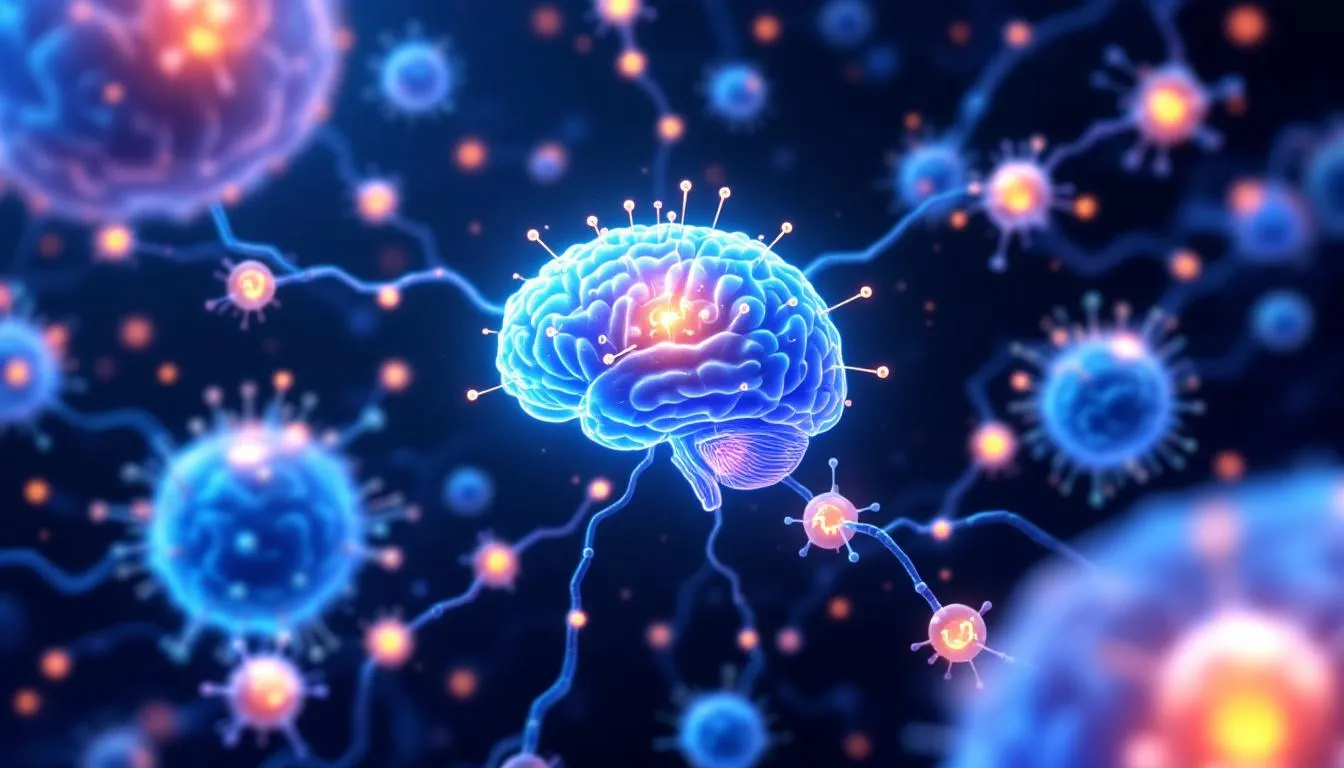Inositol for Anxiety: Scientific Insights and Brain Health

Curious if inositol for anxiety can help? Inositol is a naturally occurring substance that may influence mood by affecting key neurotransmitters. Read on to discover how inositol works for anxiety and what science says about its effectiveness.
Key Takeaways
-
Inositol, particularly myo-inositol, plays a critical role in mood regulation by modulating neurotransmitters like serotonin and dopamine, which can positively impact anxiety and mood disorders.
-
Clinical studies suggest that high doses of myo-inositol (12-18 grams daily) may significantly reduce symptoms of panic disorder, potentially offering an effective alternative to standard anxiety medications.
-
Inositol shows promise in treating various mental health conditions beyond anxiety, including OCD and bipolar disorder, while also providing potential health benefits for metabolic syndrome and PCOS.
Understanding Inositol: The Basics
Inositol is a fascinating carbohydrate that naturally occurs in the body and various foods. Often referred to as B-vitamin B8, inositol plays a crucial role in our overall health. Its chemical structure, featuring six carbons and six alcohol groups, sets it apart and contributes to its unique properties.
The most abundant form of inositol in mammalian cells is myo-inositol, which is integral to many metabolic pathways and signaling processes. This compound helps regulate blood sugar levels and insulin, thus impacting metabolic diseases and health, including metabolic dysfunction. Inositol derivatives are also a precursor to water-soluble inositol polyphosphates, an essential component of membrane lipids for various cellular functions and metabolite concentrations.
But inositol’s importance doesn’t stop there. It is vital for cell functioning and development, influencing neurotransmitter levels and glucose handling. The brain’s supply of inositol comes from recycling phosphatidylinositol derivatives, de novo synthesis, and active transport, highlighting its interconnected role in maintaining health. Understanding these basics sets the stage for exploring how inositol can impact anxiety and other mental health conditions.
How Inositol Affects Anxiety

Inositol’s influence on mood regulation lies in its ability to modulate neurotransmitters like serotonin and dopamine, which are crucial for maintaining mood stability. This modulation can have profound effects on conditions such as mood disorders, anxiety, and depression.
One of the intriguing aspects of inositol is its potential to alleviate panic disorder symptoms, primarily by affecting serotonin activity. This connection between inositol and neurotransmitters sets the stage for a deeper understanding of its mechanisms of action and the results of clinical studies.
Next, we’ll delve into how exactly inositol affects the brain and body through its various mechanisms and explore the scientific studies that have investigated its impact on anxiety.
Mechanisms of Action
The primary mechanism through which inositol impacts psychiatric disorders is by enhancing serotonin receptor activation, particularly involving the 5-HT2 subtype receptors. This activation is crucial for its antidepressant effects, making it a valuable tool in mood regulation.
Myo-inositol plays a significant role in several intracellular signaling pathways, including signal transduction, promoting insulin sensitivity and influencing various cellular processes to improve insulin sensitivity. It has also been observed to increase the density of serotonin receptors, which can positively impact mood regulation.
Inositol serves as an osmoregulator in astrocytes and acts as an intrinsic modulator of neuronal excitability. These functions highlight its complex role in maintaining brain health and stability, providing a foundation for its potential benefits in treating anxiety and other mental health conditions, including its impact on brain function, cognitive function, and glial cells.
Clinical Studies on Inositol for Anxiety
Research has shown a correlation between imbalances in myo-inositol content in the human brain and anxiety. Higher levels of myo-inositol may correlate with a significant increase in the body’s ability to reduce anxiety symptoms, making it a promising area of study.
Clinical studies have explored effective dosages for treating panic disorder, with a range of 12–18 grams of myo-inositol showing significant reductions in panic attacks. One study even found that 18 grams of inositol daily led to a larger decrease in panic attacks compared to standard anxiety medications.
Despite these promising findings, the overall effectiveness of inositol for treating panic disorders remains under investigation. Some studies, including vivo studies and research studies, report mixed results, indicating the need for more research to fully understand its potential.
These clinical insights provide a valuable foundation for considering inositol as a treatment option for anxiety disorders, emphasizing the importance of further research and consultation with healthcare providers.
Inositol for Panic Disorder
Panic disorder, characterized by unexpected panic attacks, can be debilitating. Inositol supplementation has shown potential in reducing the number and severity of these attacks, offering hope for those struggling with this condition.
Clinical studies have indicated that inositol can significantly reduce panic attacks among participants, suggesting its effectiveness as a treatment option. However, it remains crucial to consult with a healthcare provider before starting any inositol supplement, ensuring it is safe and appropriate for individual needs.
This section emphasizes the potential benefits of inositol for panic disorder, supported by scientific evidence and practical advice on its use.
Inositol's Role in Treating Other Mental Health Conditions

Beyond anxiety and panic disorders, inositol has shown potential for improving symptoms in various mental health disorders, including OCD and bipolar disorder. This broader application underscores its versatility and value in mental health treatment.
In the following subsections, we’ll delve into inositol’s specific effects on obsessive-compulsive disorder and bipolar disorder, exploring how it can be integrated into treatment plans for these conditions.
Obsessive-Compulsive Disorder
Inositol’s influence on serotonin levels is vital for mood regulation and can help alleviate anxiety symptoms, making it a promising treatment for OCD. Research indicates that inositol may alter serotonin receptor sensitivity, which can significantly improve OCD symptoms.
This section highlights the scientific basis for inositol’s effectiveness in treating OCD, providing insights into its potential as a therapeutic option.
Bipolar Disorder
Bipolar disorder, characterized by episodes of mania and bipolar depression, requires effective management strategies. Inositol may serve as a complementary treatment, potentially enhancing the effects of conventional medications and improving therapeutic outcomes.
Incorporating inositol into treatment plans can help address challenging depressive episodes in bipolar disorder, offering a holistic approach to managing this complex condition. This section underscores the potential benefits of inositol for bipolar disorder, supported by scientific evidence and practical advice.
Integrating Inositol into Your Diet
Incorporating inositol into your diet can be easily achieved by:
-
Balancing plates with a variety of foods.
-
Including beans and legumes in meals several times a week to enhance inositol levels.
-
Opting for whole foods over processed foods to further boost intake.
-
Choosing healthy snacks like nuts and seeds to increase inositol consumption.
Cooking methods can affect inositol content, so light cooking is recommended to preserve more nutrients. Next, we’ll explore specific dietary sources of inositol and the role of supplements in achieving optimal levels.
Dietary Sources of Inositol
Whole grains such as brown rice and oatmeal are excellent sources of inositol, as are citrus fruits like oranges and grapefruits. Legumes, including beans and lentils, are known for their high inositol content, while nuts and seeds such as almonds and flaxseeds also contribute significantly.
Leafy greens like spinach and mushrooms, especially shiitake, are other rich sources of inositol. The quantity of inositol obtained from certain foods can vary, but incorporating a variety of these foods can significantly enhance overall levels.
Inositol Supplements
For those who may not get enough inositol from their diet, a dietary supplement is a viable option. Myo-inositol and d-chiro inositol are the most common forms available in dietary supplements. Studies have used a range of doses, typically between 2 to 18 grams per day, to achieve desired effects.
It’s important to consult with healthcare providers before starting any supplements to ensure they are safe and appropriate for your needs. This section provides practical advice on choosing and using inositol supplements effectively.
Potential Side Effects and Safety Considerations
Inositol is generally considered safe for adults, though its effects on pregnant women, nursing mothers, and children are not fully understood. High doses, particularly over 12 grams daily, may lead to mild side effects such as stomach pain, dizziness, and headaches.
Excessive intake of inositol can result in low blood sugar, especially in individuals with diabetes. Additionally, high doses of inositol hexaphosphate might hinder the absorption of essential minerals like zinc and calcium, emphasizing the importance of moderation.
Consulting a healthcare provider before beginning any inositol supplement is advisable to avoid potential drug interactions and ensure safe usage.
Benefits
Inositol offers numerous health benefits beyond anxiety relief, including:
-
Potential health benefits by potentially reducing the risk of metabolic syndrome, characterized by obesity, high blood pressure, and dyslipidemia.
-
Improving symptoms of polycystic ovary syndrome (PCOS) in women, such as irregular menstruation.
-
Enhancing ovulation rates in women with PCOS.
During pregnancy, inositol supplementation may help prevent gestational diabetes mellitus and lower the chances of preterm births. Research also indicates that inositol may assist in alleviating symptoms related to depression, with some studies linking lower brain inositol levels to the condition.
Inositol may offer benefits for managing panic disorder by potentially decreasing the frequency and intensity of panic attacks. Limited studies suggest that incorporating inositol into treatment plans could aid in reducing symptoms of bipolar disorder.
Summary
Inositol stands out as a promising natural remedy for anxiety and various other mental health conditions. Its ability to modulate neurotransmitters like serotonin and dopamine is crucial for mood regulation, making it a valuable tool for managing anxiety disorders. Clinical studies have shown significant benefits, particularly for panic disorder, although more research is needed to fully understand its potential.
Beyond anxiety, inositol’s role in treating obsessive-compulsive disorder and bipolar disorder highlights its versatility in mental health care. Its integration into daily life is straightforward, whether through dietary sources or supplements, and it offers numerous health benefits, including improving insulin sensitivity and aiding in metabolic health.
As we continue to explore natural treatments for mental health, inositol presents a compelling option. Its safety profile, coupled with its potential health benefits, makes it a worthwhile consideration for those seeking alternative or complementary therapies. Embrace the journey towards better mental health with inositol as a potential ally.
Frequently Asked Questions
What is inositol and how does it work?
Inositol, a carbohydrate classified as B-vitamin B8, is found naturally in the body and some foods; it regulates neurotransmitter levels and glucose metabolism, impacting mood and metabolic health. This makes it beneficial for supporting emotional well-being and overall metabolic function.
Can inositol really help with anxiety and panic disorders?
Yes, inositol may effectively alleviate symptoms of anxiety and panic disorders by influencing neurotransmitters such as serotonin and dopamine. Consider discussing this option with a healthcare professional for personalized advice.
What are the dietary sources of inositol?
Inositol is abundantly found in whole grains, citrus fruits, legumes, nuts, seeds, leafy greens, and mushrooms. Including these foods in your diet can effectively boost your inositol intake.
Are there any side effects of taking inositol supplements?
Inositol supplements are generally safe, but may cause mild side effects such as stomach pain, dizziness, and headaches, especially in high doses. Individuals with diabetes should monitor their blood sugar levels when using these supplements.
How should I incorporate inositol into my routine?
To effectively incorporate inositol into your routine, consider increasing your intake through foods high in inositol or using supplements. Be sure to consult a healthcare provider for guidance on the appropriate form and dosage for your specific needs.
Researched and reviewed by Dr Elena Seranova, Ph.D. Dr Seranova holds a master's degree in Translational Neuroscience from the University of Sheffield, UK, and a Ph.D in Stem Cell Biology and Autophagy from the University of Birmingham, UK. She is a published author in multiple peer-reviewed journals, including Cell Reports and Developmental Cell.
LEARN MORE!






Leave a comment